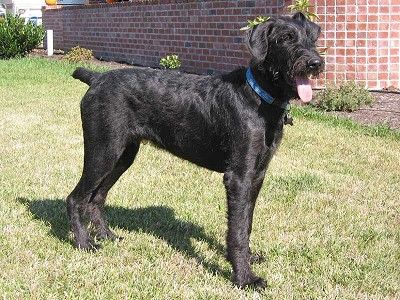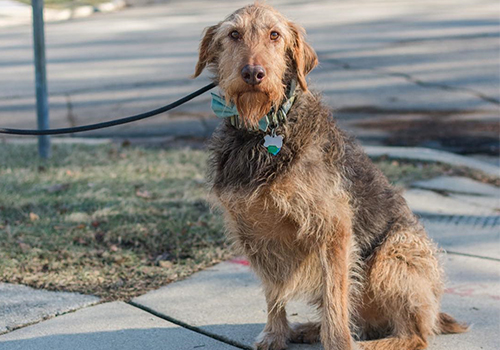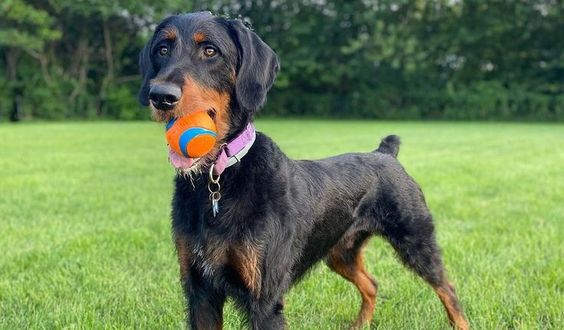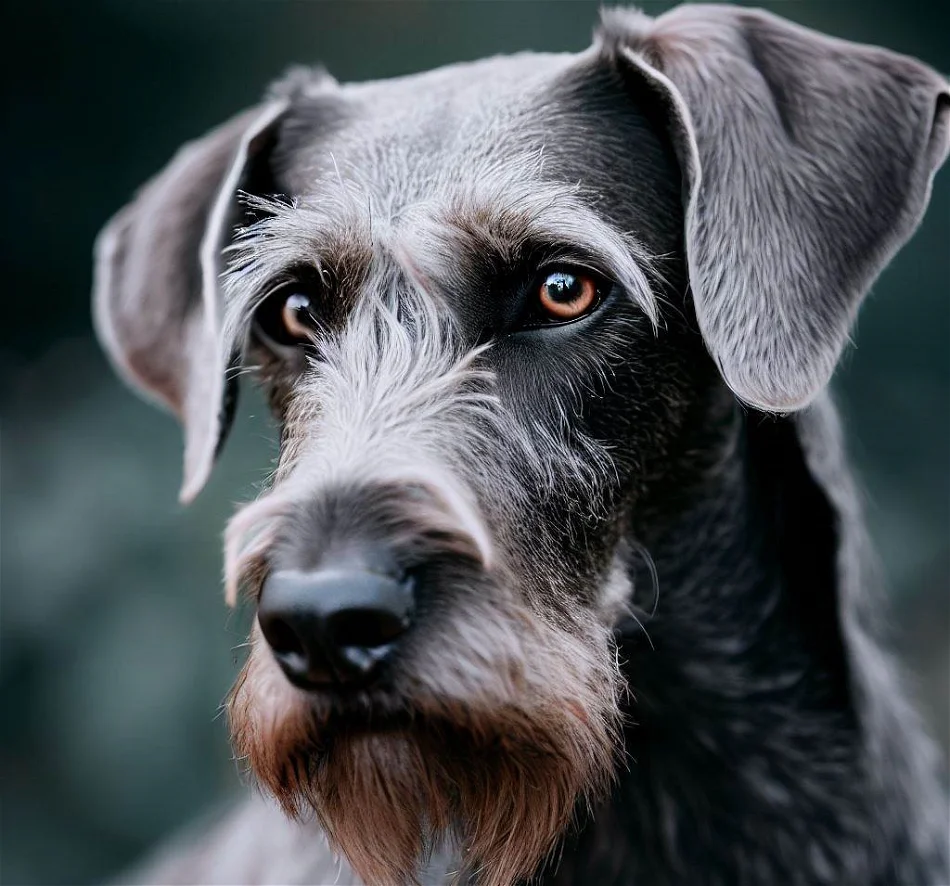Doberman Poodle Mix: Doberdoodle Dog Breed
The Doberdoodle is a new mixed breed from a Doberman Pinscher and a Poodle. This hybrid combines the Doberman’s protective instincts with the Poodle’s smarts and allergy-friendly coat. Dog lovers are starting to appreciate this mix for its loyalty, intelligence, and minimal shedding.
A Doberdoodle is typically a strong dog, weighing between 60 and 80 pounds and standing 24 to 28 inches tall at the shoulder.
Owners looking to welcome a Doberdoodle into their home should prioritize socialization and training from a young age to manage their high energy and natural guard dog tendencies. Health-wise, these dogs can inherit issues common to both Dobermans and Poodles, so attentive care and regular vet visits are necessary.
Key Takeaways
- Doberdoodle: Doberman and Poodle mix, known for intelligence and minimal shedding.
- Averages 60-80 pounds, 24-28 inches tall, training essential for energy management.
- Potential health issues; proactive care and regular vet checks recommended.
The Doberdoodle, a Doberman-Poodle mix, excels in smartness and has a low-shed coat. These dogs typically weigh between 60 to 80 pounds and stand about 24 to 28 inches. Early socialization and consistent training are vital for their energetic and protective nature, while ongoing vet care is necessary due to possible inherited health conditions.
Quick Facts
The Doberdoodle, a mix between a Doberman and a Standard Poodle, typically tips the scales at 60 to 90 pounds. This hybrid combines Doberman’s muscular build and faithful nature with the Poodle’s allergy-friendly coat.
Known for its affectionate personality, the Doberdoodle thrives in a loving home environment. The variety in their size mainly comes from the Poodle side of the family, which influences their overall weight. The choice to breed with Standard Poodles is intended to maintain a manageable size for this hybrid.
Doberdoodles are often healthier due to their mixed lineage, which introduces a broader range of genes and can lead to more robust health.
Doberdoodle Pictures






Overview
Understanding the Doberdoodle is critical to recognizing its potential as a great pet. A mix of Doberman and Standard Poodle, these dogs can weigh between 60 and 80 pounds, with the Poodle’s size impacting the hybrid’s overall size.
Doberdoodles are known for their loyalty to their families, yet they must be socialized early due to varied temperaments within the same litter. Studies have shown that mixed breeds like the Doberdoodle might be less prone to specific inherited health issues.
However, to keep them healthy, it’s essential to watch out for health problems common to both parent breeds, including bloat, eye disorders, joint issues, and thyroid problems.
Breed Key Features
Doberdoodles are known for their muscular build, keen intelligence, and protective instincts. These dogs result from a Doberman and Poodle mix, bringing together the best of both worlds for a loyal and versatile pet. Thanks to their Poodle heritage, they’re smart, which helps them learn new things quickly. Plus, their Doberman side gives them a natural inclination to guard and watch over their home.
| Feature | Doberman Influence | Poodle Influence |
|---|---|---|
| Size | 60-80 pounds | 24-28 inches |
| Temperament | Protective | Intelligent |
| Health Concerns | Joint Problems | Bloat, Eye Issues |
Understanding a Doberdoodle’s health starts with recognizing the risks from their parent breeds. Owners must stay on top of their pet’s health needs to prevent issues like joint problems from the Doberman side or bloat and eye conditions from the Poodle side. Regular check-ups and a healthy lifestyle are crucial to keeping these dogs happy and healthy.
Breed Origin Story

The Doberdoodle is a unique mix from the combination of Doberman and Poodle breeds. This crossbreed benefits from a phenomenon known as hybrid vigor, which can lead to improved health and greater genetic variety.
To fully appreciate what makes the Doberdoodle special, looking at its history and the traits it inherits from its parent breeds is helpful.
- The genetic makeup of the Doberdoodle pup comes from two well-regarded breeds: the Doberman and the Poodle. Each parent breed contributes its characteristics, shaping the Doberdoodle’s physical and behavioral qualities.
- Hybrid vigor gives the Doberdoodle a health edge, potentially reducing the risk of certain inherited conditions. This crossbreed may also exhibit a diverse genetic makeup, which can benefit its overall well-being.
- Tracing the Doberdoodle’s development reveals vital stages that have influenced its current status as a beloved pet. This history is essential for breed enthusiasts and potential owners to understand.
- Presently, efforts are underway to gain broader recognition and establish breed standards for the Doberdoodle. These measures are crucial for maintaining the breed’s quality and ensuring its future success.
Ancestral Breed Contributions
The Doberdoodle is a unique mix, drawing characteristics from its Doberman Pinscher and Poodle ancestors. The Doberman contributes its strong, watchful nature, developed by Louis Dobermann in the 1800s for protection.
In contrast, the Standard Poodle offers impressive intelligence and ease of training, a trait honed in Germany, where it excelled as a retriever in water.
This combination forges a Doberdoodle with a sturdy frame and a somewhat longer and wiry coat, displaying the strength and physical qualities passed down from its parent breeds.
Regarding behavior, Doberdoodles blend the Doberman’s guardian instincts with the Poodle’s lively and intelligent personality, making thorough training and socialization essential.
Hybrid Vigor Benefits
Crossbreeding a Doberman Pinscher with a Standard Poodle has resulted in the Doberdoodle, a mix that often enjoys better health than its purebred counterparts. Known as heterosis, this process combines the best traits of both breeds, leading to a dog that’s generally healthier and less prone to inherited health issues.
The accidental cross that created the Doberdoodle was a fortunate event, blending the best qualities from its ancestors and reducing some of the health concerns associated with each breed. This mix has a solid genetic makeup that pulls from diverse backgrounds, creating a healthier and well-rounded pet.
Historical Development Milestones
The Doberdoodle is a unique mix that started taking shape in the late 19th century, born from a cross between Doberman Pinschers and Standard Poodles. Louis Dobermann was on a mission to create a breed that would be intelligent and brave, combining the best traits of both parent breeds.
Though the early history of the Doberdoodle isn’t well recorded, it’s known that breeders in the United States began to develop this hybrid intentionally in the 1980s.
This crossbreed is appreciated for its protective nature from the Doberman side and the intelligent and friendly qualities of the Poodle, making the Doberdoodle a versatile and loyal pet.
Height and Weight Range

Understanding the size and growth patterns of a Doberdoodle is vital for any owner. These dogs vary in size due to their genetics, and it’s common to see differences among individuals. Owners should monitor their Doberdoodle’s growth rate, as it can change based on their diet and overall health.
To prevent weight issues and ensure a healthy lifestyle, it’s essential to follow weight management strategies. Knowing the breed’s standard size range helps owners gauge whether their pet grows as expected.
Average Adult Size
A Doberdoodle typically grows to a height of 24 to 28 inches at the shoulder and can weigh between 60 to 80 pounds. Some may even reach weights beyond 90 pounds. These dogs have a prominent stature that blends the robust and muscular build of the Doberman with the taller frame of a Standard Poodle.
Their size places them in the large dog category, which means they’ll need plenty of space to move around and regular exercise to stay healthy and happy. The size of an adult Doberdoodle can vary because the crossbreed mix can result in different growth outcomes.
Growth Rate Variations
Doberdoodles vary widely in size, with some reaching just 60 pounds and others growing over 90 pounds, standing anywhere from 24 to 28 inches tall at the shoulder. The size of the Poodle in their ancestry plays a significant role in this size range, as Poodles can be standard, miniature, or toy sizes. The larger Poodle varieties often lead to bigger Doberdoodles.
A detailed look at their growth shows that diet, living conditions, and how much they exercise also affect their final size. To accurately predict the adult size of a Doberdoodle, one must consider the dog’s genes and the environment it grows up in.
Weight Management Tips
Managing a Doberdoodle’s weight is vital for their overall health. These dogs, which can grow to a size of 24 to 28 inches and tip the scales at 60 to 90 pounds, need a careful mix of exercise and nutrition to stay at a healthy weight.
Monitoring their calorie intake against their daily activity helps keep them from becoming overweight, which avoids extra strain on their health. Regularly scheduled workouts do wonders for their physical and mental well-being, keeping them sharp and engaged.
A diet formulated for their specific needs, which a vet can help customize, will provide the proper nutrients considering their age, how active they are, and any health issues common to their breed.
Breed Standard Measurements
Doberdoodles are large, standing 24 to 28 inches tall at the shoulder and typically tipping the scales at 60 to 80 pounds. Some may even weigh over 90 pounds. Their size and build reflect the influence of the Standard Poodle, a breed known for its impressive size.
These solid and athletic dogs have a broad chest and deep ribcage, indicating their energetic disposition and heritage.
Their coat, blending Doberman and Poodle qualities, varies from short and coarse to longer, curly, or wavy hair, each requiring different grooming care.
Height-Weight Proportionality
Doberdoodles are known for their well-proportioned build, with weights ranging from 60 to 90 pounds and heights of 24 to 28 inches at the shoulder. This reflects the strong and athletic qualities inherited from their Doberman and Poodle ancestors.
The size of a Doberdoodle can vary depending on the Poodle parent’s size, influencing the pup’s overall height and weight. For Doberdoodles, maintaining a balanced build is vital for their agility, strength, and health.
Temperament Traits

Doberdoodles are known for their playful and energetic personalities, which means they thrive on regular exercise and fun activities. They often have a strong sense of protection, staying alert around new people.
These intelligent dogs need mental stimulation to keep them from getting bored. Socializing them early on helps them get along well with different people and other animals.
Playful and Energetic
Doberdoodles are known for their lively character and need regular play and mental stimulation to stay happy. These crossbreeds, with a Doberman and Poodle heritage, require an active lifestyle filled with ample opportunity for exercise and brain games. They may start showing unwanted habits without plenty of physical activity and mental tasks.
It’s also vital to introduce socialization early so they learn to interact positively with kids, other animals, and new people. They crave being part of the family and will do well with consistent love and care, bringing out their protective side and trainability, making them great family pets and alert watchdogs.
Protective Instincts
Doberdoodles, known for their lively nature and need for mental challenges, also show a strong instinct to protect their families. This trait is inherited from their Doberman ancestors, who are known for their guard dog abilities. These dogs are always alert and willing to defend their owners, thanks to their deep sense of loyalty.
For Doberdoodles to manage their protective behavior properly, it’s critical to start socialization and training early. They need to learn to distinguish between safe and dangerous situations, which helps them get along with other pets and people, including kids.
With the proper guidance, Doberdoodles can use their protective nature positively, making them excellent candidates for service or therapy roles and reliable household members.
Intelligence Levels
Doberdoodles are known for their sharp intelligence, making them a breeze to train and adaptable to various scenarios. Their smarts come from the Poodle’s knack for solving problems and the Doberman’s tactical thinking.
To keep a Doberdoodle’s mind active, owners should provide engaging activities like puzzle toys, obedience training, or agility classes. If these dogs don’t get enough mental exercise, they might start showing unwanted behaviors out of boredom.
Doberdoodle owners need to support their canines’ intellectual needs, which can prevent bad habits and ensure a well-behaved pet.
Socialization Needs
Doberdoodles, a bright and lively mix of Doberman and Poodle, need regular social interaction from their early days. This helps them grow into well-behaved adults and correctly directs their guard dog instincts.
Each Doberdoodle might act differently, so tailoring their social training is essential. Exposing them early to various people, places, and other dogs helps them adjust to new situations and prevents terrible behavior.
Affectionate With Family
Doberdoodles are known for their strong bond with family, often showing loyalty and a need to be close to their loved ones.
Their friendly temperament mixes their genes and how their owners interact with them. These dogs need regular socialization, and when they’re given proper training with positive feedback, they become even more connected and empathetic toward their families.
Observations have shown that although Doberdoodles are protective, they’re still gentle, primarily when raised with children from a young age.
This makes them well-rounded pets, perfect for families seeking a loving and faithful companion.
Health Concerns and Lifespan

Doberdoodles typically have a lifespan of 10 to 15 years, but their longevity greatly depends on their genetics and how they’re cared for. They may be prone to certain health conditions like cardiomyopathy and hip dysplasia, which are common in the breeds that make up their lineage.
To ensure their health, it’s essential to have consistent veterinary check-ups and health screenings to catch any issues early on. Being proactive about their health can lead to a happier, longer life for your Doberdoodle.
Lifespan Expectancy
Owners of Doberdoodles can expect their canine companions to live between 10 and 15 years. Keeping an eye on health issues like hip dysplasia and heart conditions is vital to help them reach their entire lifespan.
Due to the benefits of mixed breeding, the genetic makeup of Doberdoodles often leads to better health and potentially fewer diseases than their purebred counterparts. Yet, they can still inherit problems common to Poodles and Dobermans, such as hip dysplasia and cardiomyopathy. Regular vet visits are vital for spotting and treating these conditions early.
A balanced diet, plenty of exercise, and routine grooming are also crucial for keeping your Doberdoodle healthy and may add years to their life.
Genetic Health Risks
If you’re considering getting a Doberdoodle, be aware they can inherit health issues from their parent breeds. Though generally healthy, these dogs may face conditions like bloating, a critical stomach problem, or hip dysplasia, which is common in larger dogs.
Eye and thyroid disorders are potential concerns and heart health is vital due to the risk of cardiomyopathy. To protect your dog’s health and longevity, schedule regular vet visits and check the health history of their parents.
Preventive Care Importance
Taking good care of your Doberdoodle can help prevent health problems and ensure they live a long, happy life, possibly up to 15 years.
It’s wise to have regular vet visits to catch any health issues early, like hip dysplasia, bloat, or heart conditions that Dobermans often face.
Keeping an eye on your dog for joint, vision, and thyroid problems, common to both Poodles and Dobermans, is also a crucial part of their care.
A good diet, enough exercise, and timely medical care can make a difference in your Doberdoodle’s health and longevity.
Maintenance Essentials
When looking after a Doberdoodle, it’s vital to have a consistent routine that covers all the basics of their care:
- Grooming Needs: Regular grooming is crucial to prevent skin infections and maintain the health of their unique coat.
- Exercise Requirements: It’s essential to dedicate enough time to keep them physically active and mentally sharp.
- Dietary Habits: It’s necessary to be precise with their diet to meet their high-energy needs and avoid health issues.
We’ll go into more detail on these topics, including a schedule for regular health checks and effective training methods to help you give your Doberdoodle the best care possible.
Grooming Requirements
Keeping your Doberdoodle’s coat in top shape requires regular brushing and occasional visits to a professional groomer.
Brushing daily helps to remove dirt and loose hair, which prevents knots and keeps the coat shiny by spreading the skin’s natural oils.
Professional grooming is also needed occasionally to handle more complex tasks like specific haircuts, thorough washes, and removing any mats that brushing alone can’t fix.
These steps are vital for your pet’s coat to stay healthy and look great.
Exercise Needs
A Doberdoodle, known for its energy and intelligence, thrives with plenty of exercise. They need a minimum of two hours of activity every day to stay healthy and well-behaved. Mixing their routine with walks, runs, and agility exercises engages their mind and body. If they don’t exercise enough, they can become bored and start acting out. To prevent unwanted behavior, it’s necessary to have a consistent exercise plan.
Early socialization is also crucial for a Doberdoodle to be outgoing and friendly. A well-rounded approach to their upbringing, including physical activity and interaction with various people and environments, will help them develop into well-mannered dogs.
A well-exercised and socialized Doberdoodle is a joy, making for a happy pet and an equally delighted owner.
Feeding Guidelines
Feeding your Doberdoodle well is essential for its health and energy. An adult Doberdoodle should eat around 3 to 4 cups of premium dog food daily, split between two meals to aid digestion and help prevent bloat, which can affect large dogs.
For puppies proliferating, around one cup of high-quality puppy food each day will support their developmental needs.
Always check with your vet to create a meal plan perfect for your dog’s specific health requirements. They might suggest adding a supplement such as The One from Front of the Pack, which supports joints, skin, heart, and digestive wellness.
Pairing proper nutrition with consistent exercise will help maintain a healthy weight and promote overall well-being.
Health Check Schedule
Regular vet check-ups are vital for a Doberdoodle’s well-being, as they come from Doberman and Poodle ancestors with specific health risks. Having their hips checked for any signs of dysplasia is crucial, a common issue in both breeds. Routine hip exams and other orthopedic tests can catch problems early on.
Owners should be vigilant for symptoms of bloat, thyroid problems, and eye conditions in their Doberdoodles. Heart examinations are equally important due to the risk inherited from the Doberman side. A consistent schedule of health evaluations helps with early treatment, improving the chances for a Doberdoodle to enjoy a long and healthy life.
Training Strategies
Doberdoodles are intelligent and eager to learn, so they do best with consistent training that uses positive feedback and rewards to keep them engaged.
These dogs come from combining the alert Doberman with the intelligent Poodle, and they have the potential to excel in advanced obedience.
When training Doberdoodles, it’s essential to have a structured plan that helps prevent behavioral issues, like separation anxiety or dominance, which can come from the Doberman side.
Combining brain games with their physical workouts is critical to keeping their minds sharp.
Paying close attention to their training and care will help raise a Doberdoodle that’s well-behaved and versatile.
Dietary Requirements
Caring for Doberdoodle’s dietary needs is vital for their health and happiness. It’s essential to consider a balanced diet with the right mix of proteins, fats, carbohydrates, vitamins, and minerals to support their active lifestyle and bodily functions.
For Doberdoodles with sensitive stomachs, selecting food designed to be gentle on the digestive system can prevent allergic reactions and promote better health.
Keeping an eye on the amount of food they eat is just as important as the quality. Proper portion sizes help maintain a healthy weight and reduce the risk of obesity, a common issue in this breed.
Regular check-ups and discussions with your veterinarian will ensure your Doberdoodle’s diet meets their needs, considering their age, weight, and health concerns.
Balanced Nutritional Needs
For a Doberdoodle to feel energetic and healthy, its diet must include high-quality food that provides all the necessary nutrients.
Dogs like Doberdoodles need a mix of proteins, carbs, fats, vitamins, and minerals to stay in top shape. The right balance depends on the dog’s activity level, age, and health.
It’s essential to seek a vet’s advice to create a meal plan that avoids nutritional imbalances.
For picky eaters, adding a variety of fresh frozen or air-dried food options and the right supplements can make meals more appealing while still meeting their nutritional needs.
Regular check-ups with the vet and a well-thought-out feeding schedule are crucial to keeping your Doberdoodle in good health.
Allergy-Sensitive Diet Options
Owners of Doberdoodles should be mindful when choosing a diet that suits their dog’s specific dietary needs. These dogs are appreciated for their curly coats that typically shed less, which relieves allergy sufferers. Yet, these same dogs might have their food sensitivities that need attention.
Determining what ingredients could cause an allergic reaction in your Doberdoodle is essential. Opting for a high-quality dog food designed for dogs with sensitivities is an intelligent move. These dog foods often include unusual proteins and fewer ingredients to minimize allergy risks.
For best results, involve your vet in creating a custom diet plan that supports your dog’s health and keeps their hypoallergenic coat in great shape.
Portion Control Importance
Portion control is vital for Doberdoodles to keep them healthy and prevent weight-related issues. Overfeeding these dogs, sometimes known as Doodleman Pinschers, can lead to obesity and increase their risk of severe health problems such as hip dysplasia and bloat, which they’re naturally prone to.
Giving them the right amount of high-quality food that meets their energy needs is essential. Pairing their diet with consistent exercise helps maintain their health and prevent diseases caused by poor nutrition.
For the best advice on what and how much to feed your Doberdoodle, always consult your veterinarian for a diet plan that suits your pet’s unique requirements.
